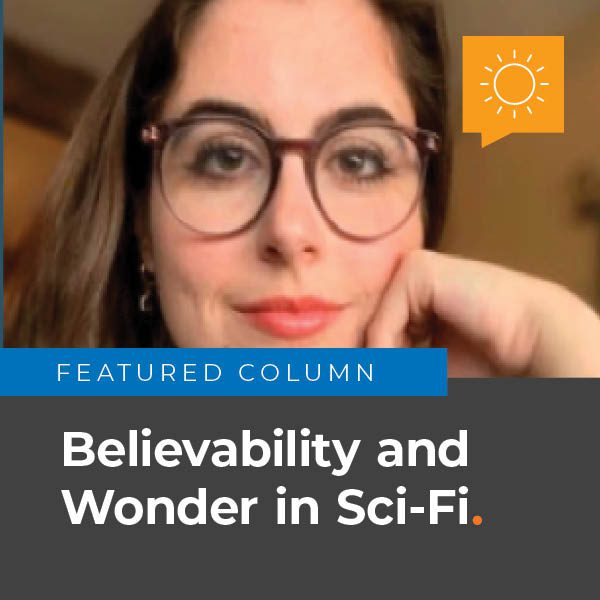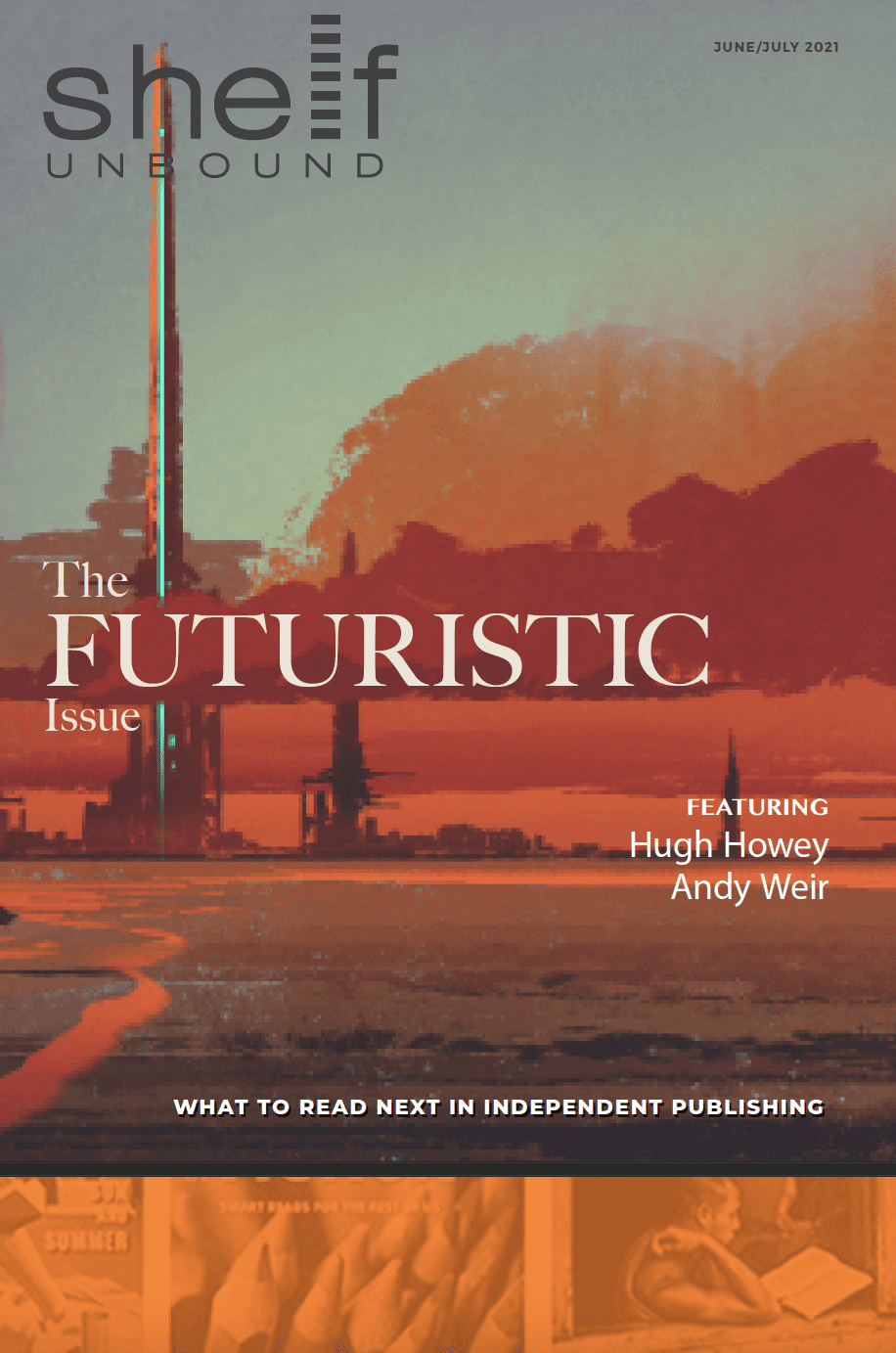BY ALYSE MGRDICHIAN

People are drawn to sci-fi for a variety of reasons. Perhaps they like the premise or the characters, or maybe they just have a niche that they consistently enjoy, like space operas or dystopias. Whatever the reason, though, all of the little facets that make the story what it is are all set within the boundaries of a created world. In order for the story’s various elements to really stick their landing, it seems necessary for the world itself to be strong and well-thought-out, since it stands to reason that the quality of the world would influence the different elements that exist within its boundaries. Keep in mind, though, that a “world” does not strictly mean a planet—in this case, a world is whatever space or situation a story is operating in. So, with this distinction in mind, what makes for a strong sci-fi world?
Sci-fi worlds, when well-thought-out, tend to have a good balance between the themes of science and fantasy. What this means is, the world is grounded enough to promote believability, and yet is imaginative enough to spark wonder. Too much scientific or technical jargon could result in the majority of readers not understanding what’s going on, making the story the niche favorite of a select few. However, on the other side of that coin, too much fantasy presents the danger of a world that is purely illogical whimsy. Although illogical whimsy can be fun in certain situations (think Alice in Wonderland), it has the potential of being a world that is hard to invest in since, when taken to its extreme, a lack of rules can create an overly convenient storyline due to illogical or inconsistent execution. So, let’s look at the themes of science and fantasy separately, and then take a closer look at the relationship between believability and wonder in sci-fi.
First, there’s science in fiction, which falls under two main umbrella genres: hard science and soft science. Hard science fiction tends to be more scientifically-minded, pulling elements from physics, astronomy, mathematics, engineering, and other STEM-related fields. It’s a rigorous genre, and is a difficult one to pull off because of all the research that it requires. However, if meticulously researched and well-executed, it can be very rewarding, because a world that is grounded in our own physical boundaries is, at the very least, a plausible one. If overdone, though, it also has the potential to make a story too heady or difficult to understand, narrowing down potential readership as a result. On the other hand, there’s soft science fiction, which tends to focus more on societal, psychological, and political elements, not delving as deeply into the hard sciences. However, while hard science has the potential to be too heady, soft science, when taken to its extreme, has the potential to use science as a mere decoration, favoring ungrounded “futuristic vibes” over believability. In this way, both genres can be executed well, but they also have the potential to be mishandled. If done effectively, though, they result in the story’s world feeling more believable, because it has been grounded in (or at least takes inspiration from) our own reality, whether it be on a social or physical level.
Then there’s fantasy, which has too many genres and subgenres to count. However, regardless of tone or genre, the theme of “creation” always remains—when you write fantasy, in any form, you’re bringing something into being that doesn’t currently exist within the boundaries of our own reality. This could mean anything from dragons and magic systems to alien invasions and hostile AI. In contrast to hard and soft science, which focus on the things that make a world more realistic, fantasy introduces the elements in a world that spark wonder. Unless you’re trying to appeal to a more technically-minded audience, too little fantasy could result in the story being a dry read. However, too much fantasy, and the fantastical elements could end up overshadowing or undermining the more realistic aspects of the story that are there to ground it, whether they be based in societal realities or physical/scientific rules. So, what then is the relationship between believability and wonder in a sci-fi world?
Believability, as mentioned before, is composed of the elements that make the story feel more realistic. For example, novels that involve space travel often pull from the hard sciences, while dystopian novels often find inspiration in the soft sciences (e.g., human governments, relationships, flaws, etc.). However, regardless of how grounded a given dystopian novel or space exploration tale may feel, there’s usually always some element, no matter how small, that sparks wonder. For example, take a science fiction novel that’s set in a futuristic (although apocalyptic) version of our current world, which is slowly being overrun by malevolent AI. And let’s say that, due to our irresponsibility regarding climate change, humanity is now slowly going extinct, and the AI are easily outliving us due to them being programmed to handle all climates. The more fantastical elements of the story would be the futuristic technology/malevolent AI. The more grounded elements, then, would be the scientific and societal realities of this new world. In what ways, scientifically speaking, could climate change wipe out humanity, and what would the surviving humans then have to do in order to stay alive? Why were the AI built in the first place, and what realistic purpose did they serve before mutinying? Additionally, what do governments and human relationships look like now? Due to socioeconomic inequality and a lack of access to resources, who would die first in this new apocalyptic world? Would humans try to have each other’s backs, or would people be fighting over resources? In this way, the premise (e.g., killer AI) is often the most fantastical element of a story, with the scientific and societal elements then grounding it and making it feel eerily possible.
In the end, sci-fi is ultimately about the balance between what’s fantastical and what’s possible. It’s important to note, though, that some people genuinely like sci-fi stories that are either pure science or pure whimsy, and that’s totally alright—I like them too, on occasion. A story is a story, and quite a lot of people prioritize concept above all else. The point of this article is not to shame the readers (or writers) who enjoy the sorts of stories that tip the scale, so to speak, between believability and wonder. Rather, the point is to clearly lay out what makes a sci-fi world easier to invest in (for general rather than niche readership), and what makes it stick with you after you’ve closed the book.
Not every story has to have groundbreaking world-building, and not every story will. But, so long as the balance between believability and wonder is given due consideration in the writing process, then the world will become one that sparks awe while, at the same time, giving the impression that it’s a reality that we (the readers) could see ourselves existing in.

